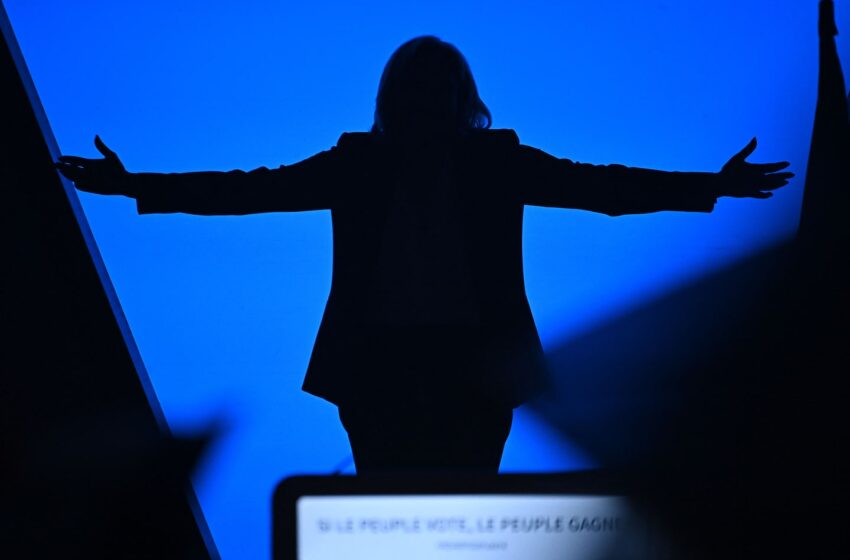
No sign of anti-Putin bump in France as Macron risks losing to Le Pen

Macron, who came to power in 2017 as a radical centrist eager to shake up French politics and play a more assertive role on the European stage, embraced the part of continental statesman. “People always rally around a wartime leader,” Nicholas Dungan, a senior fellow of the Atlantic Council, told my colleague Rick Noack. “The leadership by Macron is completely consistent with the image the French have of what their country should be doing: It’s a global power, it needs to be listened to, it should be aiming for peace.”
As Sunday’s first-round vote nears, though, Macron has reason to sweat. He will likely finish at the top of the pack, but polls now show a statistical toss-up between him and Le Pen should they face each other in the second round on April 24. “It’s one minute to midnight,” former prime minister Manuel Valls wrote in a column in French weekly Le Journal du Dimanche. “Marine Le Pen could be elected president of the republic.”
Le Pen has closed the gap on Macron no matter the bad odor of her and her party’s Russophilia — her supporters had even circulated a campaign leaflet showing her shaking Putin’s hand — and the frequent broadsides from Macron’s camp. French Finance Minister Bruno Le Maire said Thursday that, in a France led by Le Pen, “there would be less sovereignty because we would be allies of Russia, of Vladimir Putin.”
The French presidential election has tightened a lot in recent weeks as Marine Le Pen has consolidated the right. This is probably a combination of Éric Zemmour voters coming home and Le Pen seeming less extreme to Valérie Pécresse supporters because of Zemmour’s presence. pic.twitter.com/HdOvcSd6NY
— Lenny Bronner (@lennybronner) April 7, 2022
The reality is Le Pen has surged on the back of voter concerns that have little to do with the geopolitics of ending the war in Ukraine. “Polls show that a majority of the French worry that the cost of living has increased under Macron’s presidency, even as the economy overall has weathered the coronavirus pandemic and other crises,” my colleagues explained. “The war in Ukraine has prompted growing concerns over rising inflation, surging energy prices and insufficient pensions.”
Le Pen, who lost in a landslide to Macron in 2017, has tried to detoxify her and her party’s image as one steeped in neo-fascist resentments, racism and anti-Semitism. She was aided by the maverick campaign of ultranationalist gadfly Eric Zemmour, whose snarling anti-immigrant, anti-establishment rhetoric has made Le Pen — a far-right mainstay for years — look comparatively moderate. And her campaign has waved the banner of economic populism as much as it also tries to harness far-right cultural anxieties. Le Pen condemned the invasion of Ukraine as a violation of international law and has welcomed Ukrainian refugees.
“She was able to change her brand image,” David Dubois, professor of digital marketing at Insead, a leading business school, told the Financial Times. “She’s really made an effort to change her discourse from immigration to rising prices and how to increase the purchasing power of French people.”
Contrast that with Macron, who has throughout his five years in power been viewed as an aloof elitist — a “Jupiterian” president, as the French put it, ensconced in his Olympian abode. The former investment banker is attacked both by Le Pen and his critics to the left as an effete figure ruling for the rich, disconnected from the concerns of ordinary French workers.
“Le Pen did a proximity campaign, visiting a lot of small towns and villages. Her trips were not very much covered by national press but had a big echo in local media,” Mathieu Gallard, research director at polling firm Ipsos, told Politico. “She gave an impression of proximity, which is very important for French voters.”
Speaking of polling errors. Le Pen’s surge has also been visible in the runoff polling against Macron. She is now one large polling error away from winning the Presidency, and there are still two and a half weeks before the second round. pic.twitter.com/GSUeO6zJti
— Lenny Bronner (@lennybronner) April 7, 2022
In an interview with the Spectator, a right-leaning British publication, Le Pen cast Macron as an agent of global capital. “The policies I want to implement are not meant for the stock markets, which will be a change from Emmanuel Macron,” she said. “It’s not the markets that create jobs, it’s not international finance.”
She claimed Macron’s objective is “to encourage nomadism, the permanent movement of uprooted people from one continent to another, to make them interchangeable and, in essence, to render them anonymous.” (No matter that, on questions of national identity and religious freedoms, Macron’s government has pivoted sharply to the right.) When asked what leaders she admired on the world stage, she named three right-wing nationalists: India’s Narendra Modi, Britain’s Boris Johnson and Putin.
“I have respect for Vladimir Putin because he defends the interests of Russia,” she said.
Such rhetoric suggests that her rebranding is purely cosmetic. That’s Macron’s contention, anyway. “The fundamentals of the far right are always the same: attacks on and rejection of the Republic, a base of antisemitism — if not overt, at least cultivated — very clear xenophobia and an ultraconservative drive,” he said in an interview with Le Figaro, a French daily.
